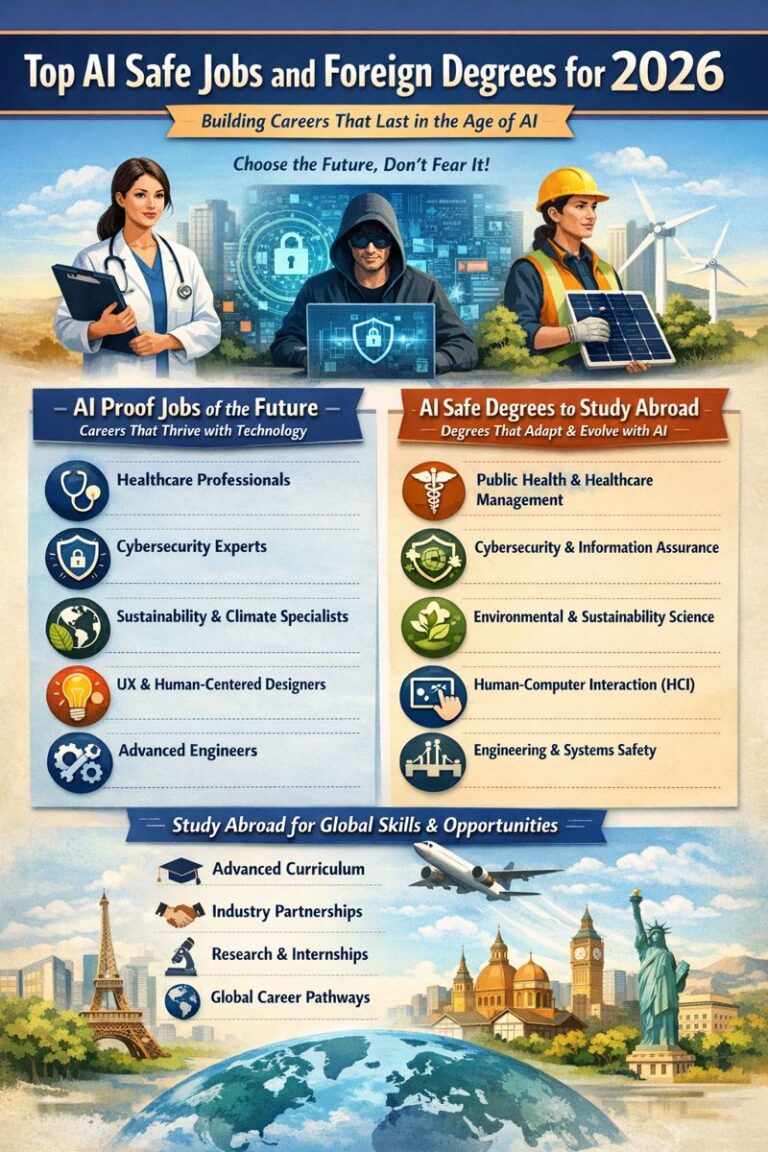If you are planning to study in the USA, like the 331,602 Indian students enrolled in the country as of 2024, you can choose to study for just a few weeks or months in a short-term course.
Several international students choose short courses to:
- Gain an American classroom experience without the cost of a full degree, or earn skills alongside their current full-time programme;
- Strengthen their resume for roles in IT, business, design, healthcare, and more. Studies have shown an increase in earnings of 10% and 20% on average after short-term credentials.
These programmes include short credit courses, summer exchange classes, coding boot camps, and professional certificates that lead directly to workplace skills. Top universities, including MIT, Harvard, Stanford and UC Berkeley, also run flagship short-term tracks that welcome visiting students.
Remember that you will still need the correct visa, proof of funds, and health insurance—points we cover below. But let’s first understand short-term courses in a bit more detail.
Note: For many Indian students, short-term courses in the USA are a smart way to boost career prospects without committing to a full degree. But picking the right university and managing your finances can still feel overwhelming.
That’s where GradRight’s university search platform can help.
It compares 40,000+ global programs based on your goals, helping you shortlist U.S. short-term courses that are reputable, skill-focused, and value-for-money. Whether you’re eyeing coding bootcamps, summer exchanges, or certificate courses from top universities like Stanford or MIT, the platform shows you what fits you best.
At the same time, GradRight’s loan-search platform can help you cover your costs — including tuition, visa, and insurance — with:
- Offers from 15+ banks and NBFCs
- No collateral or cosigner required in many cases
- Loan disbursal in as little as 10 days
- Complete guidance from start to finish
Now let’s explore the different types of short-term programs you can apply for.
What are short-term courses in the USA for international students?
EducationUSA, an official USA State Department network, defines a short-term programme as any study lasting twelve months or less.
These courses are preferred for their flexibility and industry-relevant skills. Many of these are available online or offer part-time formats, so they can also be taken with a full-time degree or job commitments.
They are also known to provide a competitive edge in the job market, with many students using them to advance their careers or pivot to new fields. Popular fields among international students are:
- Business analytics
- Data science
- AI
- Digital marketing
- Cybersecurity
- Project management
In general, short-term courses in the USA can be split into three categories.
Summer/Winter Schools & ESL (4 – 12 weeks)
University summer or winter sessions let you join regular undergraduates for 3-, 6-, 8- or 12-week classes. UC Berkeley, for example, offers all four lengths and accepts visiting international students for credit-bearing study.
Similarly, the University of San Diego’s Hansen Summer Exchange Program is a three-week leadership program for international students. This fully funded Hansen Leadership Institute covers airfare, meals, visa costs, stipend, accommodation, and activities.
English as a Second Language (ESL) intensive programs are also popular among international students. They operate on USA campuses year-round, and many run 6- to 8-week cycles to build academic English skills.
Professional Certificates (3 – 12 months)
Top universities, such as Harvard Extension School, award graduate and postgraduate short-term certificate courses in the USA for international students. Examples include:
- Harvard’s Business Analytics Certificate
- MIT’s 12-week Professional Certificate in Machine Learning & Artificial Intelligence
- Stanford’s Advanced Project Management Certificate
These certificates allow you to finish three to five courses and can be completed in under a year if taken consecutively.
Several community colleges also run one-year “certificate of achievement” tracks in fields like digital marketing, early-childhood education, computer science, medical assisting.
Boot Camps & Vocational Programmes (6 – 28 weeks)
Coding boot camps compress full-stack web development, data science, or UX design into an average of 14 weeks of intensive training. Vocational schools offer hands-on skills in culinary arts, automotive repair, and aviation maintenance. Course length ranges from a few months to one year.
Across all formats, the common thread is flexibility and speed. You receive a certificate or transcript as soon as you finish your course, which may or may not include tests.
Eligibility for short-term courses in the USA
Each short course, like full-length degree courses, can have separate admission requirements. Typical requirements include:
- Educational Background: Most programs require at least a high school diploma or bachelor’s degree, depending on the course level.
- Prerequisite Knowledge: Some courses expect foundational knowledge in relevant subjects (e.g., statistics, programming, business fundamentals).
- English Proficiency: International students will also need to demonstrate English proficiency through standardized tests (TOEFL, IELTS).
- Work Experience: Certain professional certificates may prefer or require prior work experience.
However, several certificate courses and boot camps do not have any prerequisites. For instance, Harvard’s Data Analytics Graduate Certificate has no formal application process and students can enroll directly in courses. However, a foundation in subjects such as introductory statistics, calculus and linear algebra, is recommended.
Additionally, some universities only open short-term courses or summer schools to international students who are enrolled in a full-time degree programme at their home institution.
Admission process for short-term courses in the USA
Short courses are easier to apply for. Since many offer rolling admissions, the application and admission process is straightforward.
For summer or winter schools, there may be fixed application deadlines. For example:
- UC Berkeley Summer Sessions lets you choose 3-, 6-, 8- or 12-week blocks; Session C (8 weeks) for 2025 begins in late June, with applications closing about six weeks earlier.
- Stanford Summer Session opens its eight-week intake each January and advises international students to finish applications by mid-March.
You can submit school documents online directly on the university’s website. These may include:
- Most short programmes need a:
- passport copy,
- transcripts,
- proof of funds (bank letter or loan sanction)
- and an English score (often IELTS 6.0 + or TOEFL 79 +).
Each university portal shows exact uploads and rolling/priority dates.
Most credit and certificate short-term courses require an F-1 student visa in the USA. The table below summarises your options.
| Visa Type | Eligible Courses | Duration | Example Programs |
| B-1/B-2 | Recreational, non-credit courses | Less than 18 hours per week | Language/cultural workshops, hobby classes |
| F-1 | Academic, for-credit/certificate | Short/long | Harvard Extension School certificates, summer schools |
| M-1 | Vocational/technical programs | Short/long | Culinary, cosmetology, technical diplomas |
Try to book your visa slot as soon as the I-20 arrives, as June to August dates fill fast for Indian cities.
Fees for short-term courses in the USA
Average fees for short-term courses vary widely; the table below breaks them down.
| Course type | Typical tuition |
| Individual short courses | $1,500–$4,000 per course |
| ESL / Summer Exchange | $450–750 per credit ($3,000 for a 6-credit session) |
| University certificates | $3,800–15,000 for 3-5 courses spread over 6–12 months. (UCLA Digital Marketing’s candidacy + tuition: $4,000.) |
| Campus summer term (8 weeks) | $5,197 + tuition at Stanford; full residential package: $18,443. |
| Coding boot camps | $13,584 average for a 12- to 16-week full-stack course |
Hence, you can expect $2,000–3,500 per course and $6,000–$17,000 for a full certificate program, at top universities. While community colleges in the USA offer affordable short-term courses for international students, with a fee of about $1,000–5,000 for a one-year ‘Certificate of Achievement.’
For living expenses, you can budget $1,200–1,600 per month for housing, food, local transport and health insurance in most college towns.
Scholarships & Fee Relief
Some non-degree scholarships can be applied to short-term courses in the USA.
- The Hubert Humphrey Fellowship covers tuition, living expenses, and more for a year of non-degree study and professional development at select USA universities.
- Global UGRAD Exchange Program offers a fully funded semester-long exchange for undergraduates. This includes tuition, travel and living costs.
Many universities also give merit discounts of 5 to 20 % on summer or certificate tuition. Always tick the “international aid” box in your application.
Top institutions offering short-term courses in the USA
Here is a list of some of the top universities that offer short-term courses in the USA. Most of these schools also provide optional practical training (OPT), which is crucial for Indian students planning a short stint of work experience.
| University & Course | Format / Duration | Why Pick It? |
| Harvard Extension School – Graduate Certificate in Data Science | 9–12 months online or on campus. | Ivy League brand with flexible evening classes. |
| MIT Professional Education – Professional Certificate in Machine Learning & AI | 12-week live-virtual programme with weekend labs. | Deep-tech skills taught by MIT faculty |
| UC Berkeley Summer Sessions | 4, 6 and 8-week 600 plus course (online, in-person) | Transferable credits, Silicon Valley networking. |
| Stanford Summer Session – “Introduction to International Relations” | 8-weeks, 4-unit credit course | Study politics on a world-class campus; visa-friendly timetable. |
| UCLA Extension – Digital Marketing Certificate | 2 academic quarters (6–9 months) part-time | OPT-eligible, evening or online classes, strong LA industry ties. |
| NYU SPS – Certificate in Data Visualization | 4-week intensive online module (one of four courses; whole certificate ≤ 2 semesters). | Manhattan location and electives you can mix with work. |
| Harvard Summer School | 3 to 7 weeks (400 plus courses over 60 subject areas) | Harvard credit, mix of on-campus and online study |
Overall, short-term courses in the USA let you upgrade skills quickly, control costs, and still experience a top campus in the country. With smart planning and timely visa/OPT paperwork, you can walk away in under a year with a USA credential, without the cost of a full degree.
FAQs
1. What are short-term courses in the USA for international students?
Short-term courses are programs under twelve months that offer focused learning without committing to a full degree. Some of the best short-term courses in the USA for international students are ESL, summer exchange, university certificates, and coding boot camps.
2. What are the eligibility criteria for short-term courses in the USA?
You generally need an I-20 from a SEVP-approved school, an F-1 (academic) or M-1 (vocational) visa, proof of funds, a passport, and IELTS/TOEFL showing English proficiency.
3. How do I apply for short-term courses in the USA?
You can submit an online application with the necessary documents to apply for a short course in USA universities.
4. What is the cost of short-term courses in the USA?
Tuition fee for ESL or summer sessions is around $3–6 k and certificates cost about $4–15 k.
5. re there scholarships available for short-term courses in the USA?
Some fellowships and university merit discounts can partially or fully cover tuition, application fees, or living costs for eligible short programs.


















